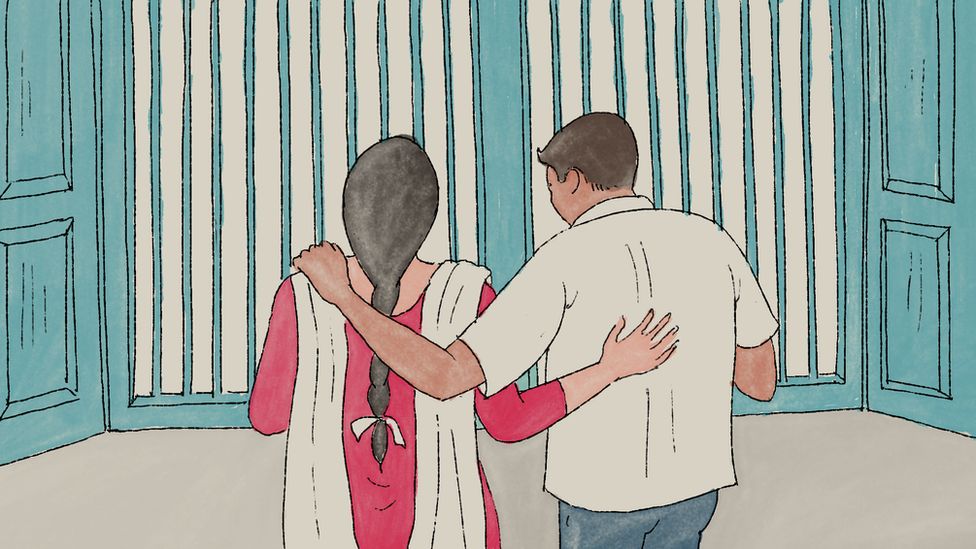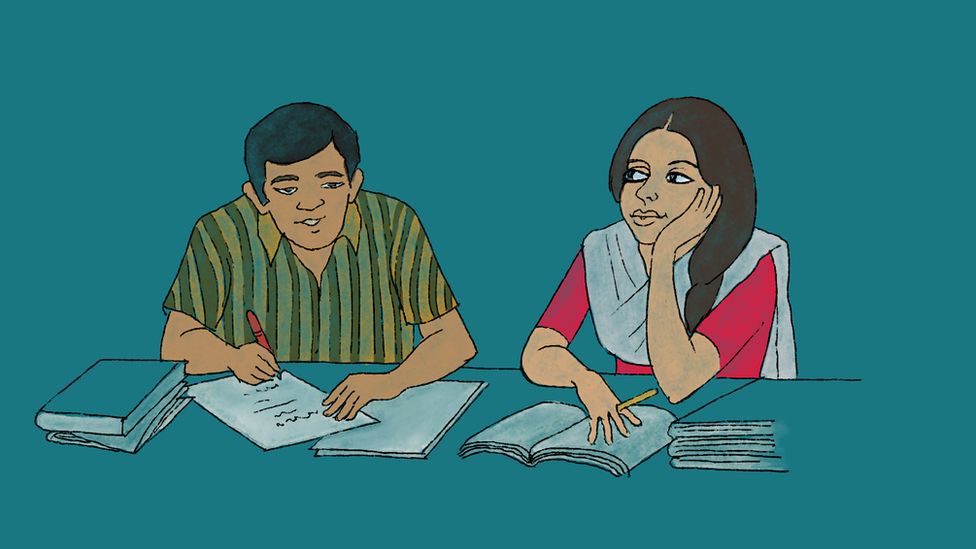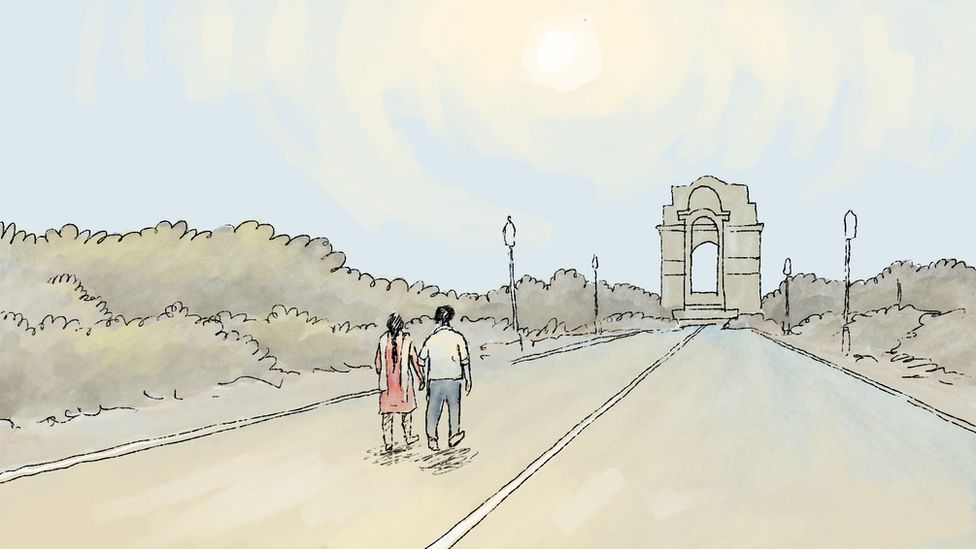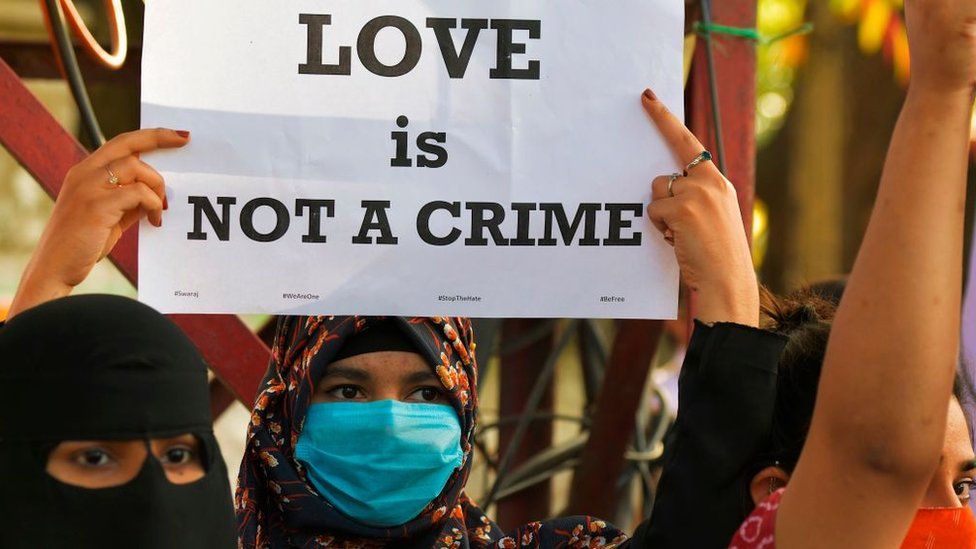A controversial new anti-conversion law that criminalises interfaith love has put Hindu-Muslim couples on edge. Now, they face the wrath of not just their families, but also the Indian state.
The iron door opened just enough for the girl to peep out. She looked scared.
Ayesha and her boyfriend, Santosh (both their names have been changed) are on the run. “My parents have come to look for me and they are outside somewhere,” Ayesha said. “We are scared. We have been asked to stay inside.”
The couple, both 29, fled their home town in the western state of Gujarat. For now, they are living in a safe house – a nondescript two-story building – in Delhi. Also hiding with them is another couple from Uttar Pradesh state in India’s north.
In November 2020, Uttar Pradesh became the first state to pass a law – Prohibition of Unlawful Religious Conversion Ordinance – banning “unlawful conversion” by force, fraudulent means or marriage. It was in response to what right-wing Hindu groups call “love jihad”, an Islamophobic term denoting a baseless conspiracy theory that accuses Muslim men of seeking to make Hindu women fall in love with them with the sole purpose of converting them to Islam.

The law has led to multiple cases and arrests in UP, a state governed by India’s Hindu nationalist Bharatiya Janata Party (BJP). Madhya Pradesh, another BJP-ruled state, has already passed a similar law and others, including Gujarat, are mulling doing the same. So couples are now leaving these states to marry in what they consider “safer” places such as Delhi.
Interfaith marriages in India are registered under the Special Marriage Act, which mandates a 30-day notice period. But couples live in fear of reprisals throughout this time and even more so now, with a new law that targets such marriages.
It’s yet another obstacle in Ayesha and Santosh’s 13-year-long relationship.
They met in college in Gujarat in 2009. He was studying Gujarati, and she was an economics student.
“We had a common Hindi class,” Ayesha said. They became friends and grew close. Two years later, she finally asked him if he loved her and, if he did, why couldn’t he admit it?
Santosh loved her but he also knew that the road ahead would be hard in Gujarat, a state where communal tensions run deep.

They both belong to India’s middle class – Ayesha’s father ran a small local business and she was a school teacher. Santosh’s father was a clerk at the university, where he had a data entry job. He also worked as a freelance photographer.
But Ayesha is Muslim and Santosh is a Dalit (formerly untouchable), a community that is at the bottom of the unyielding Hindu caste hierarchy.
They both recalled 2002, when more than 1,000 people, mostly Muslims, died in riots after a train fire killed 60 Hindu pilgrims in Gujarat. Muslims were blamed for starting the fire. It was one of India’s worst episodes of religious violence.
And Ayesha and Santosh, who grew up in the shadow it cast, were well aware of the consequences of love that was considered out of bounds.
“In Gujarat, being an interfaith couple is a big problem,” Santosh said. “You can’t meet, you can’t talk, you can’t do anything.”
But they were undeterred. Santosh told Ayesha that once they began a relationship, he would be in it until the end.
After graduating from college in 2012, they met rarely – but when they did it was the result of meticulous planning. They would meet in public places so it wouldn’t arouse suspicion. And they would keep it short.
“We would meet with cloth wrapped around our faces,” Santosh said.
The rest of the time they kept in touch over the phone.
“We would save each other’s numbers under false names or call from other phones,” he added. Since Ayesha’s family monitored her calls, Santosh often mimicked a woman’s voice when he called her.
When Santosh’s parents found out about the relationship, they decided to get him married. They even forced him into an engagement with a girl last November.
“I was depressed for days. I couldn’t talk to Ayesha as her family had also come to know by then,” he said.
Ayesha’s father and brother were pressurising her to marry as well.
So Santosh and Ayesha tried to get married in Gujarat – they filed a petition to register the wedding under the Special Marriage Act. But the clerk, who saw Ayesha’s name in the paperwork, alerted her father.

Santosh paid a lawyer 25,000 rupees ($340; £250) to get their marriage registered, but the lawyer backed out.
“No officials agreed to help. No lawyers would take our case. They would say this is an interfaith marriage and it is dangerous for them. They told us to not to do it,” he said. “Perhaps, there are [right-wing] vigilante groups on the court premises.”
Time was running out. So the couple decided to run away. “I wanted to be with Ayesha. We had no other choice,” Santosh said.
On 22 January, they came to Delhi hoping to finally marry.
They say that it was on the flight to Delhi that they spent hours together for the first time in their 13-year courtship.
When they arrived, they sought out the offices of Dhanak, the group that runs the safe house. They informed their parents and the respective police stations that they were in Delhi. They moved to the safe house on 29 January.
Dhanak facilitates marriages between interfaith couples. Its founder, Asif Iqbal, says they have been receiving many calls from couples wanting to get married ever since the new anti-conversion law was passed in Uttar Pradesh.
“Santosh was crying when he called,” Mr Iqbal said.
Most couples end up losing their jobs while in hiding. Santosh and Ayesha are looking for work. They are worried and scared but they say trust in each other is keeping them going.
“Love is sacrifice,” Ayesha said.
For now, they say, they have a place to live and they are with each other.
“They say love is blind but it’s hatred that is blind,” Santosh said.
All illustrations by Gopal Shoonya

https://emp.bbc.com/emp/SMPj/2.39.19/iframe.htmlmedia caption
What happens when a Hindu and Muslim YouTuber meet?

